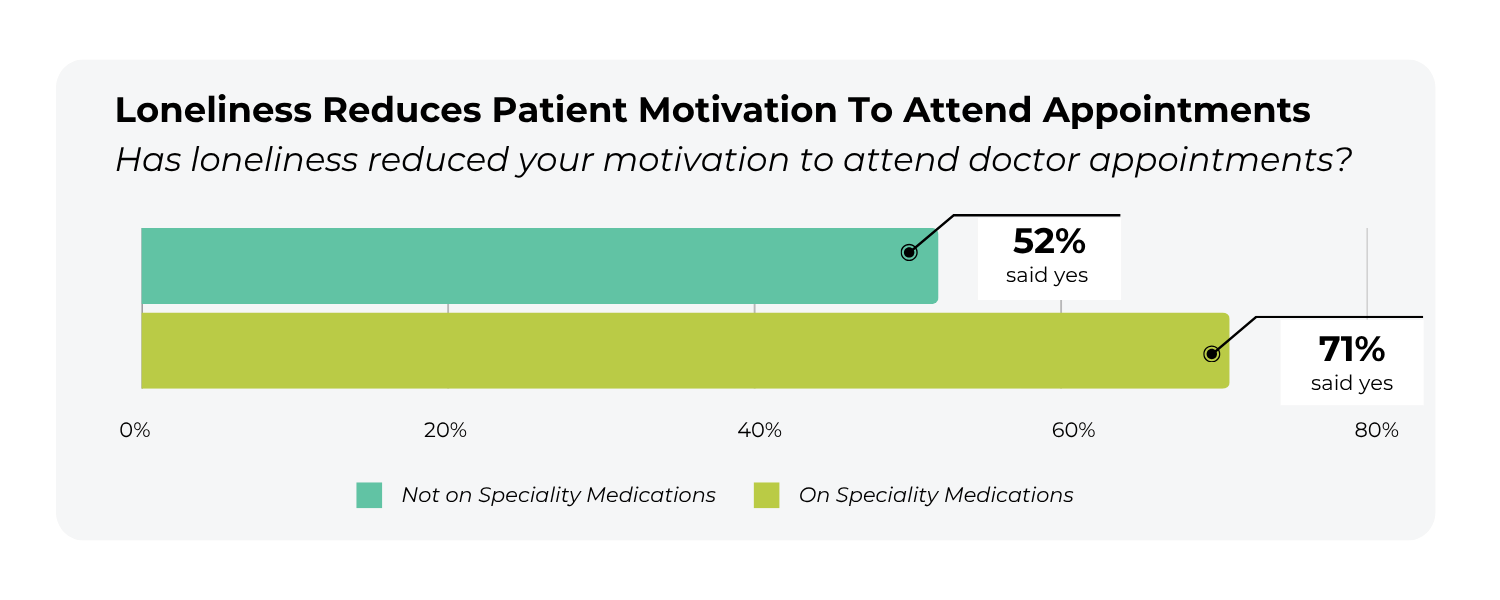Patient Engagement Statistics: How Loneliness Impacts Chronic Care
When people talk about patient engagement statistics, they often focus on digital health tools, appointment attendance, or medication adherence rates. But one factor is often overlooked: loneliness. Pleio’s report, Loneliness and Health Behaviors: A Missing Link in Chronic Care, highlights how isolation directly undermines engagement for patients managing chronic conditions.
Loneliness Blocks Care Navigation
Emotional disengagement from care isn’t just about missed reminders or poor health literacy. For many patients, loneliness itself is the barrier.
- 52% of patients on non-specialty medications said loneliness reduced their motivation to attend doctor appointments.
- That number rises to 71% for patients on specialty medications.
The problem extends beyond missed visits. Patients often struggle to retain critical information shared at diagnosis:
- 71% of patients on specialty medications reported difficulty remembering important health information (vs. 49% of non-specialty patients).
These statistics show how isolation disrupts care at crucial moments. Without connection and support, patients are left overwhelmed, undersupported, and at risk of falling off their treatment plans.
The Transactional Nature of Care Relationships
Another striking finding is how patients view their relationships with pharmacists:
- 80% of specialty patients described the relationship as transactional, compared to 70% of non-specialty patients.
When the patient-pharmacist connection feels like a transaction instead of a partnership, opportunities for engagement, trust, and long-term adherence are lost.
Patients Seek Support Outside Providers
Many lonely patients aren’t reaching out to their clinical care teams at all, simply because access is too difficult:
- 53% of patients said they struggle to get in touch with their providers because responses take too long.
Instead, patients are open to peer-to-patient support models, especially when facilitated through trusted health partners like pharmacists or pharmaceutical manufacturers:
- 70% of patients said they’d be open to peer phone calls via their pharmacist.
- Of those, 89% said the experience would likely reduce their feelings of loneliness.
- 74% said they’d be more likely to manage their condition better if a peer reached out with guidance and empathy.
Why Peer Support Works
Engagement is not just about communication; it’s about connection. Patients themselves say so:
- 74% of patients report that they retain more information when it comes from someone they genuinely connect with.
Authenticity and empathy transform health conversations into meaningful relationships that improve adherence and outcomes. For patients navigating the complexity of chronic illness, peer support fills both an emotional and informational gap that traditional care often leaves unaddressed.
What These Patient Engagement Statistics Tell Us
These patient engagement statistics make one thing clear: loneliness is a hidden driver of disengagement in chronic care. Specialty patients in particular face heightened emotional barriers, leading to missed appointments, forgotten instructions, and transactional relationships with providers.
By investing in peer-to-patient models and rethinking how pharmacists and manufacturers engage with patients, healthcare organizations can create authentic connections that improve adherence and drive better health outcomes.
Interested in learning more? Explore how Pleio’s GoodStart program helps patients feel supported, connected, and confident in managing their treatment plans.


